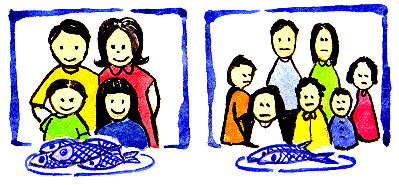Supported by The David and Lucile Packard Foundation
PATH Foundation Philippines, Inc. is a private, non-profit, non-stock corporation registered with the Philippine Securities and Exchange Commission in 1992. Our mission is to improve reproductive health and environmentally sustainable development in undeserved areas of the Philippines. We achieve results by involving and supporting client groups and target communities to adapt and apply appropriate technologies to address local problems and priorities. PFPIs programs are supported by contributions from international and domestic organizations.
Integrated Population and Coastal Resource Management Initiative
In an effort to implement these recommended strategies and contribute to the evolving field of experience in integrated population-development, PATH Foundation Philippines, Inc. is spearheading an Integrated Population and Coastal Resource Management (IPOPCORM) initiative, with support from the David and Lucille Packard Foundation and other contributors.
Goal, Purpose and Objective of IPOPCORM
The goal of the IPOPCORM initiative is to improve the quality of life of human communities that depend upon coastal resources while maintaining biological diversity and productivity of coastal ecosystems. The goal is consistent with the National Biodiversity Strategy and Action Plan of the Philippines’, Department of Environment and Natural Resources (DENR) and the goal of United Nations Joint Group of Experts.
The purpose of IPOPCORM is to encourage and support integration of population management and reproductive health strategies into coastal resource management (CRM) plans and projects in selected biogeographic zones characterized by high marine biodiversity, high population growth and young population age structure. Within these “hot spot” areas, PATH Foundation will work through local partners to achieve the following objectives:
- Improve reproductive health outcomes among people living in coastal communities,
- Enhance management of coastal and marine resources through local capacity building,
- Support alternative livelihood options as means to reduce food security risks and reinforce best CRM practices
- Use mass media and targeted campaigns to increase the public and policymakers’ awareness of population – environment links and solutions.
Target Groups
The IPOPCORM initiative focuses on three groups in particular for its site-based work and public education activities:
- Generate political commitment and support for integrated approaches to poverty alleviation that incorporate RH strategies
- Expand planning capacity of provincial/municipal governments on integrated poverty-population-environment
- Create LGU capacity to establish and sustain community-based family planning systems
- Improve family planning acceptance and use in focal areas
Fishermen and Sexual network members; IPOPCORM addresses the unmet needs of men in fishing and coastal communities for human sexuality information, education and communication (IEC) and reproductive health services including STD and AIDS prevention education, contraceptive management and family planning, and behavior modification to improve responsible sexuality and reduce reproductive health risks. This strategy will complement and supplement the government’s family planning and reproductive health program, which is primarily targeted to women.
Our “Man Talk” communications strategy is being developed and implemented with and for fishermen, using the indigenous leader model of peer mediated behavior change. It addresses all aspects of human sexuality, including growing interest in sexual dysfunctional disorders among men. This serves as an entry point for later discussions on safer sex practice, responsible sexuality and practical ways to reduce risk of dysfunctional disorders, e.g., reduce consumption of alcohol and tobacco.
Youth, in terms of both their emerging sexuality and as future stewards of the environment is another special target group.
Entrepreneurs who often profit from natural resources are being encouraged to create economic livelihoods that are environmentally friendly. Private pharmacists also fall under the entrepreneur category because they have the potential to become social entrepreneurs through participation in social marketing activities that the project supports to increase availability of affordable reproductive health products in coastal areas.


